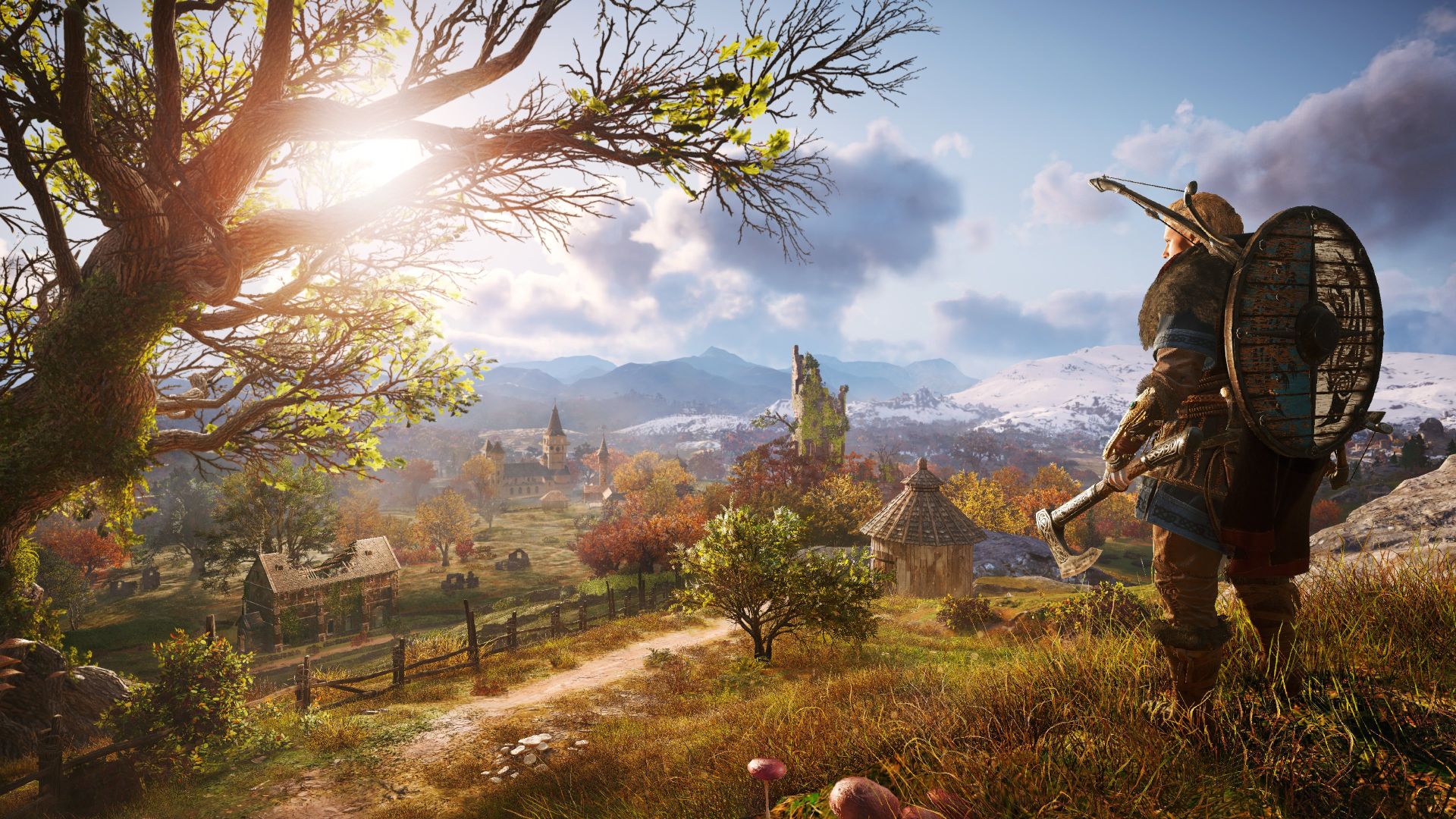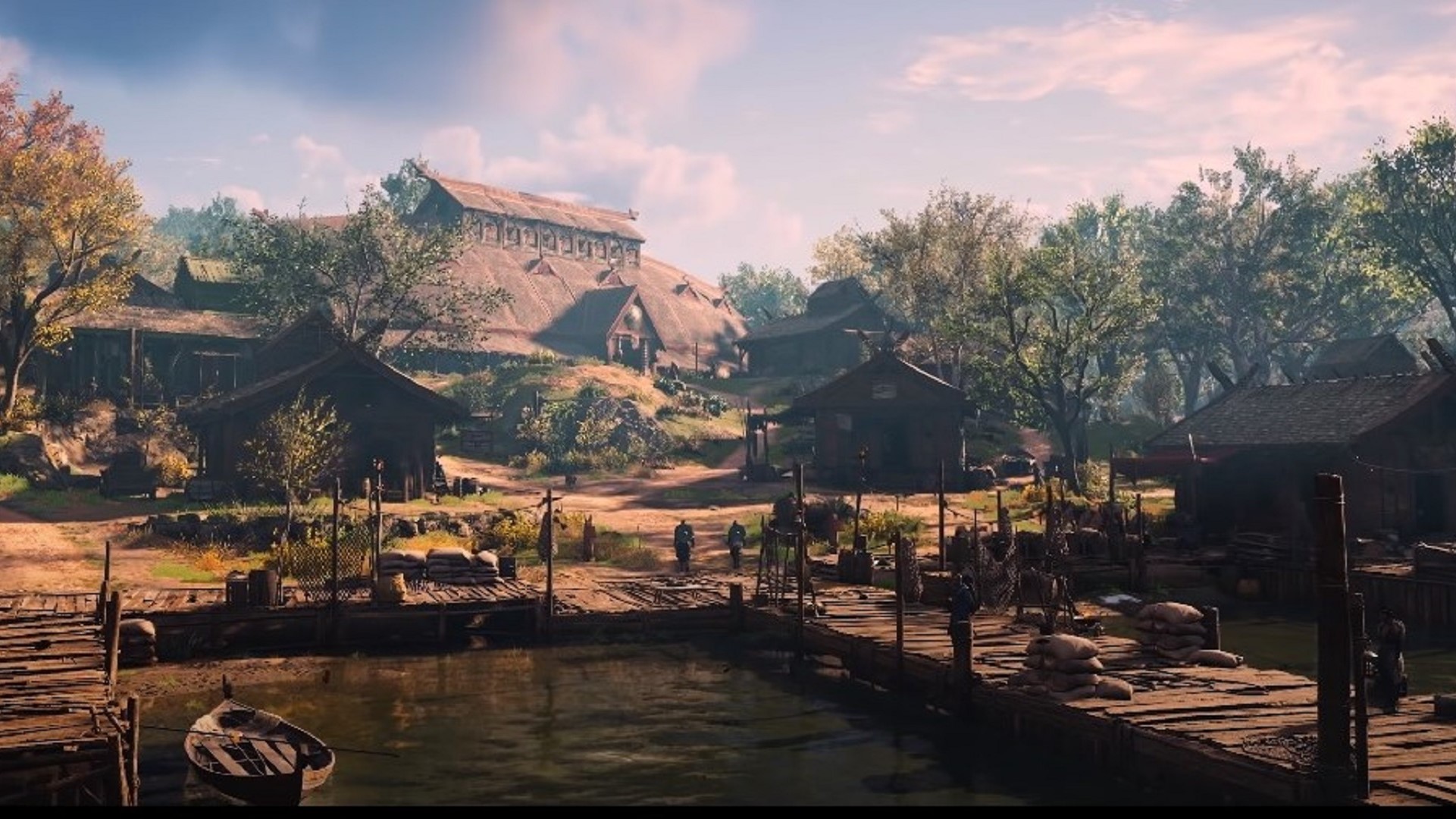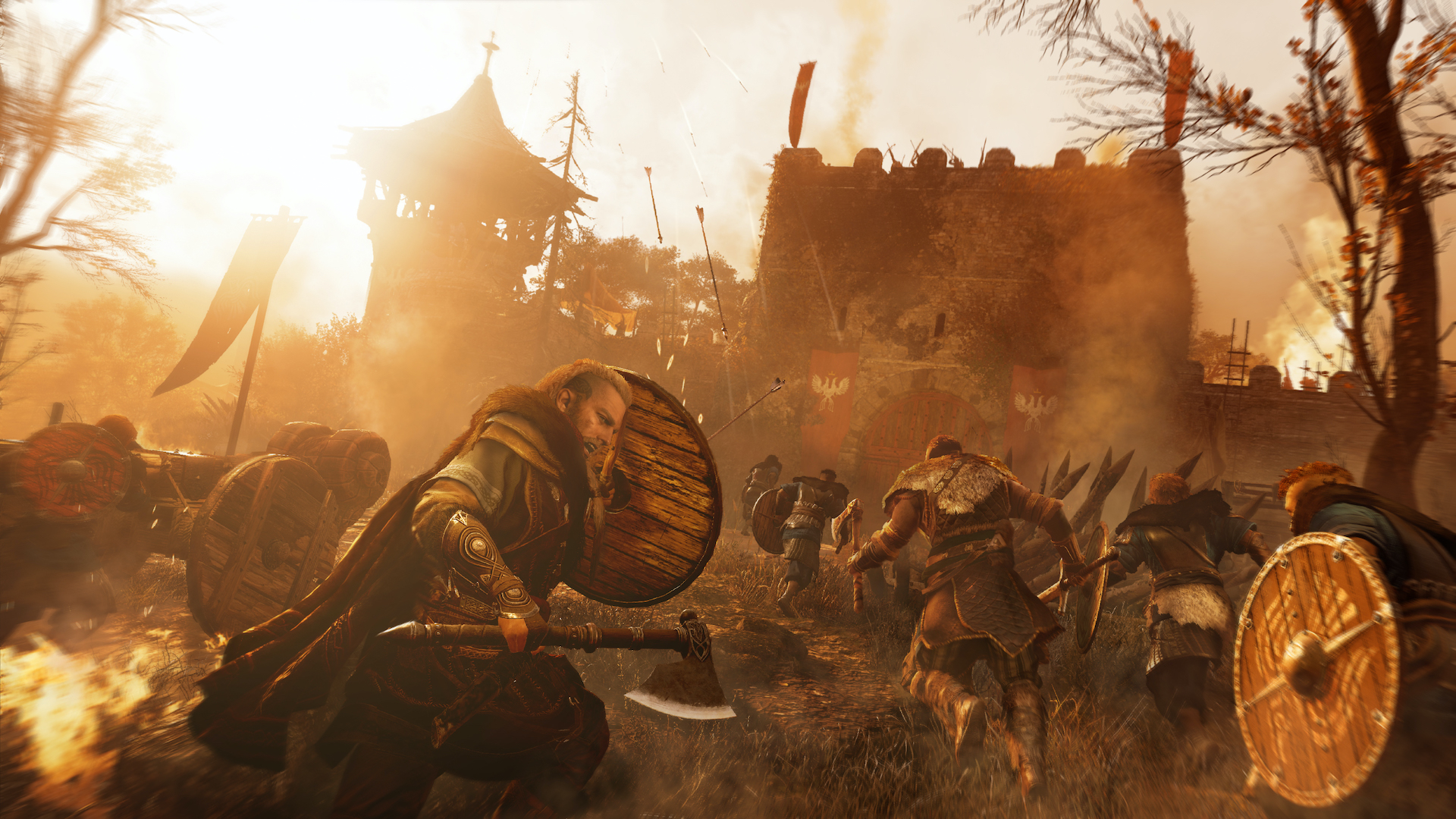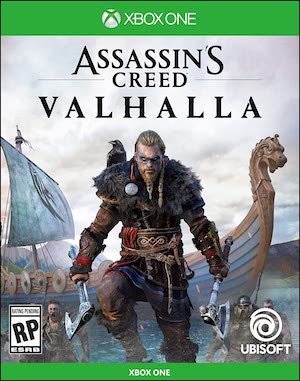
The Assassin’s Creed series has gone through some radical changes over the last few years. After reinventing itself with Assassin’s Creed Origins and then taking bold steps into action RPG territory with Odyssey, the series has now comfortably settled into its new identity. With Assassin’s Creed Valhalla, Ubisoft have attempted to take that new formula to its zenith by building on its predecessors’ strengths and addressing the issues that plagued them- and it’s surprising just how convincingly they’ve managed to do just that. The series’ third crack at the massive open world RPG formula is also its most confident, making for a streamlined yet sprawling adventure that ranks as one of the best it has delivered since its inception over a decade ago.
In Assassin’s Creed Valhalla, you play as Eivor, a Norse warrior tasked with leading their Viking clan out of Norway and into newer, greener pastures. Eivor and company find themselves in 9th century England after a lengthy prologue section, and have to figure out how to settle down and make a new home for themselves in this new country. England is divided into several kingdoms, with conflict brewing in all corners, and navigating these treacherous political landscapes while trying to forge alliances and strengthen your clan’s new home forms the backbone of Valhalla’s story.
The thing that stands out to me about Valhalla the most is its quest structure. Rather than constantly assaulting players with a barrage of quests and side quests the way Origins and Odyssey did, Valhalla instead chooses to divvy up its story into several long arcs. Each arc is a story of its own, featuring new characters, unique conflicts, and difficult choices to make that impact how the narrative plays out, and though each arc feels sufficiently separate from the others, they all operate within a larger framework. As such, Valhalla gives itself the freedom to flex its creative muscles and try new things with different arcs, but still manages to tell a single, larger, cohesive story that is consistently engaging, thanks to strong characters and intriguing narrative developments that keep coming at a steady pace.
"Assassin’s Creed’s third crack at the massive open world RPG formula is also its most confident, making for a streamlined yet sprawling adventure that ranks as one of the best the series has delivered since its inception over a decade ago."
Valhalla’s narrative is also one that longtime series fans will greatly appreciate. Set several centuries after Origins and some centuries before Assassin’s Creed 1, Valhalla bridges the gap between the series’ two distinct eras very effectively. Like recent Assassin’s Creed games, it is still somewhat separated from the central Assassins vs Templars conflict that defines the series, but it manages to have just enough of that larger narrative thread it doesn’t feel as isolated from it. The game achieves this by having a lot of references and callbacks to that broader series-wide storyline, as well as some big narrative developments on that front. At the same time, however, that story does stay more in the background than in traditional Assassin’s Creed games. As such, Valhalla feels like it’s straddling both eras of the franchise quite effectively- delivering plenty of both, but not all of each.
Going back to the quest structure, which is probably Valhalla’s greatest strength, Ubisoft’s decision to split the game into multiple longform narrative arcs works out great, because it allows them to sidestep what has been one of the series’ biggest issues of late. As far as actual traditional quests are concerned, Valhalla focuses almost exclusively on main story quests, with everything else now being treated as side activities that organically happen in the open world.
In place of side quests, you have World Events. Each World Event is at most a 5-10-minute-long affair, involving a single objective or a unique conversation, culminating in appropriate rewards and small amounts of XP being doled out. World Events don’t pop up on the world map, and they don’t show up in your quest log, and when you’re in the middle of one, the game doesn’t prompt you to an objective with updates via text- everything happens within the world itself. As such, they end up feeling like naturally occurring random encounters, and no longer does the game overwhelm you with a dozen markers for unique side quests every time you enter a new area. World Events are short, bite-sized mini-stories that feel appropriately skippable- though if you choose not to skip them, Valhalla ensures that your time doesn’t feel wasted, either with material rewards or intriguing short stories and narrative moments.
"Valhalla feels like it’s straddling both eras of the franchise quite effectively- delivering plenty of both, but not all of each."
Other than World Events, there are plenty of other activities to undertake in the massive world of Assassin’s Creed Valhalla. From collecting artifacts and playing dice games to engaging in flyting competitions and looking for legendary treasures, Valhalla has enough going on in its world to keep you engaged for dozens of hours even if you choose to completely ignore the main story. The most enjoyable optional activity in the game is raiding, which is appropriate for a game in which you play as a Viking invader. Gathering your crew of soldiers, travelling down rivers in your longship, and putting villages and towns to the torch while you pillage and take their treasures to add to your own settlement is exactly as addictive and thrilling as you would hope.
That aforementioned settlement – called Ravensthorpe – is the heart and soul of Assassin’s Creed Valhalla, in terms of both, story and gameplay. Eivor’s ultimately goal is to strengthen and expand Ravensthorpe, to turn it into a thriving settlement where you and your clan can lead a comfortable life, and everything you do in the game revolves around that central throughline. This isn’t the first time an Assassin’s Creed game has had a central hub location that you upgrade throughout the course of the game, but Valhalla’s Ravensthorpe feels much more integral to the experience than, say Monteriggioni did to Assassin’s Creed 2, or the Homestead did to Assassin’s Creed 3.
Upgrading Ravensthorpe is something that you’ll be doing throughout Assassin’s Creed Valhalla. Your primary means of doing so is by unlocking and building new structures, and doing that enough times levels up the settlement, with there being six levels in total. From a fishing hut to stables to a museum and a barracks, from individual houses for characters to buildings such as breweries or bakeries to make your feasts that much grander, there’s a vast array of options as far as new buildings and upgrades are concerned, and most feel like meaningful additions to your Viking community. Returning to Ravensthorpe after finishing a long arc feels like coming back home, as it should, and watching the settlement slowly grow over time, going from a ramshackle collection of tents in the beginning to a bustling town full of amenities and allies later on in the game, feels incredibly gratifying. It pulls the whole experience together quite effectively.
"Returning to Ravensthorpe after finishing a long arc feels like coming back home, as it should, and watching the settlement slowly grow over time, going from a ramshackle collection of tents in the beginning to a bustling town full of amenities and allies later on in the game, feels incredibly gratifying."
In keeping with Valhalla’s central strength of being a more cohesive and streamlined experience, progression mechanics have also been polished very well. There is a vast skill tree to dive into in the game, and it has enough depth and complexity to make stealth, melee, and ranged builds feel equally viable, without ever locking you into a single path of progression, and easily letting you respec your character if you ever want to. The progression’s pacing is much more consistent as well, which means grinding for XP doesn’t feel nearly as compulsory as it has in recent Assassin’s Creed games, which complements the game’s redefined quest structure very well.
Various passive abilities – such as a perfect dodge that slows down time, or performing takedowns that instantly fill your adrenaline meter – can also be unlocked through the skill tree. Meanwhile, interestingly enough, the more active combat abilities in this game are unlocked not by leveling up, but by exploring. There are various Books of Knowledge scattered throughout the world of Assassin’s Creed Valhalla, and each of them either unlocks new abilities or powers up the ones you’ve already unlocked. Getting to each of these is also a challenge, either because they’re guarded heavily behind enemy lines, or because finding the path to them is a challenge in and of itself. Tying this part of character progression into more active gameplay actions and exploration works out really well, and ensures that taking on optional open world activities feels even more meaningful and rewarding.
The decisions you make for your character’s loot and gear also have more weight in Valhalla. Rather than giving you dozens of new gear pieces to equip and discard every few minutes, Valhalla puts a greater emphasis on upgrading the gear that you already have, which is done through resources and materials that you find in the open world, or by slotting runes into them to give you more buffs. You will spend far more time with the armour sets and weapons in your possession than you did in Origins and Odyssey, because upgrading and making them more effective them feels much more rewarding than swapping them out for new loot.
"There is a vast skill tree to dive into in the game, and it has enough depth and complexity to make stealth, melee, and ranged builds feel equally viable, without ever locking you into a single path of progression, and easily letting you respec your character if you ever want to."
The one area where Assassin’s Creed Valhalla feels like a bit of a step back from Odyssey – to me, personally, at least – is the combat. It’s not a drastic step back by any means- by and large, the combat system here is largely similar to the previous two games, and if you liked the combat then, you’ll like it now. It just feels a bit slower and, as such, a bit clunkier than it did in Odyssey. I suppose that slower, more visceral combat makes sense, given the game’s Viking theme, but nevertheless, I miss the thrilling, fast-paced, punchy combat of Assassin’s Creed Odyssey.
From a visuals perspective, Assassin’s Creed Valhalla is unsurprisingly beautiful. Large, varied worlds that are teeming with life and atmosphere are sort of a specialty for this series, and Valhalla definitely does not disappoint on that front. Both Norway and the much larger England are beautiful locations, and the game often left me slack jawed with strikingly beautiful vistas and landscapes. After all this time, Unity still remains the best-looking game in the series, but with Valhalla, the series has come closer to that level of visual fidelity than ever before.
There are still some technical issues here that need to be called out though. Several NPCs – especially those that aren’t important characters in the story – have laughably bad animations and facial models. The latter especially has been an issue in Ubisoft games for a while now, and while the main characters definitely look much better, it’s disappointing that this is something that still hasn’t been addressed on a larger scale. Meanwhile, other issues that fans of the series will be familiar with – such as texture pop in and instances of characters walking into walls in the background or getting momentarily stuck in the environment’s geometry – still pop up every now and then.
"After all this time, Unity still remains the best-looking game in the series, but with Valhalla, the series has come closer to that level of visual fidelity than ever before."
Assassin’s Creed Origins and Odyssey were impressive games, and I don’t want to underplay just how good both of them were- but both of them also felt a bit too massive for their own good, Odyssey especially. “Ubisoft bloat” is something that we’ve all spoken about often these past few years, and Assassin’s Creed’s recent efforts were perfectly emblematic of that issue- they could feel a bit too cluttered, as if they were attempting too many things and sacrificing cohesion as a result. Valhalla sidesteps that problem. It delivers, a massive, sprawling adventure that stands toe-to-toe with its predecessor in terms of size and scope, but it packages its systems, its world, and its story in much more cohesive fashion.
Assassin’s Creed Valhalla is the most streamlined game in the series in years, without sacrificing the type and quantity of content that players have come to expect from Assassin’s Creed. It is a game that works directly to address many of its predecessors’ flaws, while also bringing some intriguing takes on series and genre tropes of its own to the table. This blend of ambition and tradition makes this the series’ best outing in years, one that can appeal to newcomers, recent fans, and series veterans alike with an enthralling and potently crafted adventure.
This game was reviewed on the Xbox One.
The world is large, beautiful, and diverse; Exploration feels rewarding and engaging; New quest structure is much more streamlined and cuts out much of the bloat; Consistent and complex progression that sidesteps issues with grinding; Longform narrative arcs come together for an engaging and cohesive adventure; Series veterans will find lots to love in the story; Settlement building pulls the whole experience together very effectively.
Combat feels clunkier than Odyssey; Some visual rough edges and technical issues.





















